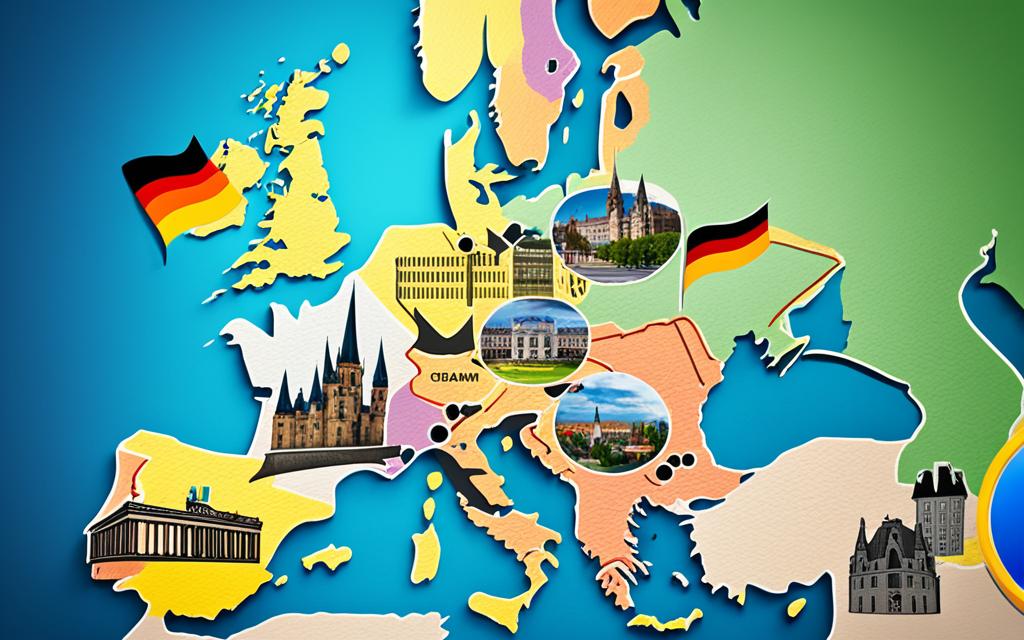Welcome to our guide on expanding your UK business to France. In today’s global economy, venturing into new markets is essential for growth and success. France, as a leading economic power in Europe, offers excellent opportunities for UK businesses looking to expand their reach.
Entering the European market can open doors to a wider customer base, increased revenue streams, and greater international exposure. With its diverse industry sectors and business-friendly environment, France presents a promising destination for UK companies seeking to broaden their horizons.
In this article, we will explore the reasons why expanding to France is a smart business move. We’ll also delve into key considerations such as market research and analysis, legal and regulatory requirements, cultural adaptation, and effective marketing strategies. By the end, you’ll be equipped with the knowledge needed to expand your business successfully in France.
So, let’s get started on this exciting journey of taking your UK business to the thriving European market.
Why expand to France?
When considering international growth opportunities, expanding your UK business to France can be a strategic move with a multitude of benefits. France, as a prominent country in the European market, presents numerous business opportunities and a gateway to further expansion.
The European market offers a vast customer base and a thriving economy that can fuel your business’s growth. By establishing a presence in France, you gain access to not only the French market but also the wider European Union, enabling you to reach millions of potential customers.
Furthermore, France boasts a diverse range of industries and sectors, from technology and finance to tourism and luxury goods. This diversity opens up various avenues for UK businesses, allowing them to tap into new markets and diversify their products or services.
- Expand your customer base and increase revenue potential.
- Tap into the lucrative markets of the European Union.
- Access a diverse range of industries and sectors.
- Benefit from France’s business-friendly environment and strong infrastructure.
Expanding to France also offers the opportunity to enhance your brand’s international reputation. Establishing a presence in a highly regarded European nation like France can positively impact your brand’s credibility and enable you to differentiate yourself from competitors.
In conclusion, expanding your UK business to France presents exciting business opportunities in the European market and supports international growth. With the potential for a wider customer base, diverse industries, and enhanced brand reputation, venturing into France can be a strategic move that propels your business to new heights.
Market research and analysis
Before expanding your business to France, conducting comprehensive market research and analysis is crucial. This process allows you to gather valuable insights that will inform your business strategy and increase your chances of success in the new market.
Market research involves studying the French market landscape, understanding consumer behavior, and identifying potential opportunities. By analyzing market trends, customer preferences, and competitors, you can gain a deep understanding of the market dynamics and make informed decisions.
To begin with, it’s important to identify your target audience in France. By understanding their needs, preferences, and buying habits, you can tailor your products or services to effectively meet their demands. This customer-centric approach will not only help you attract customers but also build long-lasting relationships.
Data Collection and Analysis
Data collection is an essential part of market research. It involves gathering information from reliable sources such as industry reports, market surveys, and customer feedback. This data provides valuable insights about the size of the market, customer demographics, and the competitive landscape.
Once you have collected the necessary data, the next step is to analyze it. This involves organizing, interpreting, and drawing conclusions from the data to identify trends, opportunities, and challenges. By analyzing the data, you can gain a competitive edge and develop effective strategies to differentiate your business in the French market.
Understanding the Competitive Landscape
Assessing the competitive landscape is crucial to position your business effectively in the French market. It involves identifying your direct and indirect competitors, understanding their strengths and weaknesses, and evaluating their market share. This analysis helps you identify gaps in the market and develop strategies to stand out from the competition.
Furthermore, understanding the competitive landscape allows you to identify potential partnerships or collaborations that can help you navigate the market more effectively. By analyzing the competitive landscape, you can gain insights into successful market tactics and determine how you can differentiate your business to attract customers.
In conclusion, market research and analysis form the foundation for successfully expanding your business to France. By identifying your target audience, analyzing market data, and understanding the competitive landscape, you can develop a robust business strategy that aligns with the preferences and demands of the French market.
Legal and regulatory considerations
When expanding your business to France, it is essential to understand the legal and regulatory requirements to set up a company. Complying with the French business regulations will ensure a smooth and successful entry into the market.
Company Formation
Before setting up a company in France, you need to select the appropriate legal structure, such as a SARL (Société à Responsabilité Limitée) or a SAS (Société par Actions Simplifiée). Each structure has specific requirements and implications, so it is crucial to seek professional advice to determine the best fit for your business.
Tax Obligations
France has a complex tax system, and understanding your tax obligations is vital to avoid any legal issues. You will need to register for various taxes, including corporate tax, value-added tax (VAT), and social security contributions. Consulting with a tax advisor or an accountant can help ensure compliance with the French tax laws.
Employment Laws
France has stringent labor laws that protect employees’ rights and regulate employer-employee relationships. It is crucial to familiarize yourself with French employment laws, such as minimum wage requirements, working hours, and termination procedures. Employing a local human resources expert can provide valuable guidance in navigating the complex labor regulations.
Ensuring compliance with legal and regulatory requirements will help you establish a solid foundation for your business in France. By understanding the legal framework and seeking professional advice, you can confidently set up and operate your company within the bounds of French business regulations.
Cultural adaptation and language
Expanding your business to a new country brings exciting opportunities, but it also requires careful consideration of cultural differences and language barriers. To successfully enter the French market, it is crucial to localize your business and adapt your marketing strategies to resonate with the local audience.
Cultural differences play a significant role in shaping consumer behavior and attitudes towards businesses. Understanding and respecting the French culture will help you build trust and credibility with your target market. This involves researching and incorporating cultural nuances into your marketing campaigns, product offerings, and customer experience.
One effective way to bridge the cultural gap is by working with local experts or hiring native French employees who can provide valuable insights and assist with localizing your business. This can include translating your website, product descriptions, and marketing materials into French to ensure clear communication with your target audience.
Language barriers can pose challenges when expanding to a new country. It is important to have a clear communication strategy in place to overcome these obstacles. Providing multilingual customer support, offering translated content, and ensuring that your website is user-friendly for French-speaking customers will help establish a strong presence in the local market.
Building relationships with the local community is crucial for gaining trust and establishing your business as a respected player in the French market. Engaging in local events, partnering with French influencers, and supporting local charities or organizations can help foster goodwill and create a positive perception of your brand.
Remember, cultural adaptation and overcoming language barriers are essential steps in localizing your business in France. By embracing the unique cultural aspects and tailoring your approach to the local market, you will increase your chances of success and maximize your business growth.
Marketing and sales strategies
When expanding your business to France, developing effective marketing and sales strategies is crucial for success. A well-defined market entry strategy will enable you to navigate the French market and maximize your chances of reaching your target customers.
Firstly, identifying your target market is essential. Conduct thorough market research to understand the preferences, behaviors, and needs of your potential customers in France. This will help you tailor your marketing messages and offerings to resonate with the local audience.
Once you have identified your target market, focus on customer acquisition. Implement various strategies to attract and engage customers, such as online advertising, social media marketing, and partnerships with local influencers. Building strong relationships with your customers will not only drive sales but also contribute to long-term business growth.
Furthermore, consider collaborating with local partners or distributors who have a deep understanding of the French market. They can provide valuable insights, support your market entry efforts, and help you navigate any cultural or language barriers that may arise.












